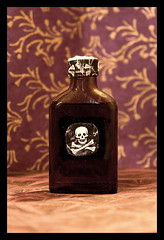 In the speculative-fiction community, there's been a lot of hullabaloo and hand wringing over the gender composition of genre tales. A great number of folks seem concerned about the segregation of the sexes into various compositional camps, and a critically lauded periodical even released a women's-only issue to address the perceived inequity. I guess I understand their concerns. Stories soon grow stale when written from only a single point of view, and men and women have tended to gravitate toward different genres. After all, would you expect a woman to pen an unsentimental dark fantasy about the illegitimate child of a prince who gets groomed to become the crown's secret killer? Well, you might if you've ever picked up Robin Hobb's Assassin's Apprentice.
In the speculative-fiction community, there's been a lot of hullabaloo and hand wringing over the gender composition of genre tales. A great number of folks seem concerned about the segregation of the sexes into various compositional camps, and a critically lauded periodical even released a women's-only issue to address the perceived inequity. I guess I understand their concerns. Stories soon grow stale when written from only a single point of view, and men and women have tended to gravitate toward different genres. After all, would you expect a woman to pen an unsentimental dark fantasy about the illegitimate child of a prince who gets groomed to become the crown's secret killer? Well, you might if you've ever picked up Robin Hobb's Assassin's Apprentice.The boy doesn't have a name. Discovered at the age of six, he holds the infamous distinction of being Prince Chivalry's bastard, a reality that'll cause the beloved Prince-in-Waiting to surrender his claim on the throne. The Farseers (for that is the name of the ruling family of the Six Duchies) supposedly draw their names from their inherent character, but the boy will soon learn that may be as much fancy as fact. Prince Chivalry showed little of his namesake deference to the son who never met him. Prince Verity's truthfulness borders on being uncouth. Prince Regal shows more interest in the lavish accoutrements of lordship than in behaving as benefits a royal. And the boy, well, he never receives a name. Most seem content to call bastard or Fitz, long-running slang for an illegitimate born of nobility. King Shrewd alone lives up to his namesake. The old ruler knows that a bastard can be a liability -- or an asset. Through his machinations, the boy will transform from an unwanted outcast to a skilled killer.
Though Assassin's Apprentice appears on more than a few must-read lists, the initial chapters prove ... underwhelming. Hobb spends most of the book's first quarter detailing the history of the Six Duchies, introducing the nobility, laying out a pair of competing magic systems (a blue-blooded riff on psionics called the Skill and an ancient communion with animals dubbed the Wit), detailing the boy's slow transition from pariah to poisoner, and gradually unfurling an ongoing conflict with the Red-Ship Raiders, a mysterious band of hostile seafarers. It's slow going. However, thinking of it as the steady bending of a bow to full draw may help readers soldier on to the good stuff -- and what good stuff there is. The early worldbuilding and characterization get pulled into a finale that's one of the most thrilling I've ever read. Though not quite on George R.R. Martin's level, Hobb shows a willingness to pull few narrative punches, and that commitment to storytelling got me thinking about the whole proportional representation conundrum. In the end, does the sex of an author really matter all that much? Readers want compelling tales first and foremost, and that's exactly what Hobb has provided.
(Picture: CC 2007 by Andrew Kuznetsov)


2 comments:
I haven't read any of Robin Hobb's work, but with a recommendation like that, I'll have to change that :) After I post this I'll hit up my library's website to place a hold on Assassin's Apprentice :)
I don't normally read one volume right after another, but I moved on to Royal Assassin and (so far) like it even better. Just be prepared for some slow going in the start. But the ending -- man! It's great.
Post a Comment